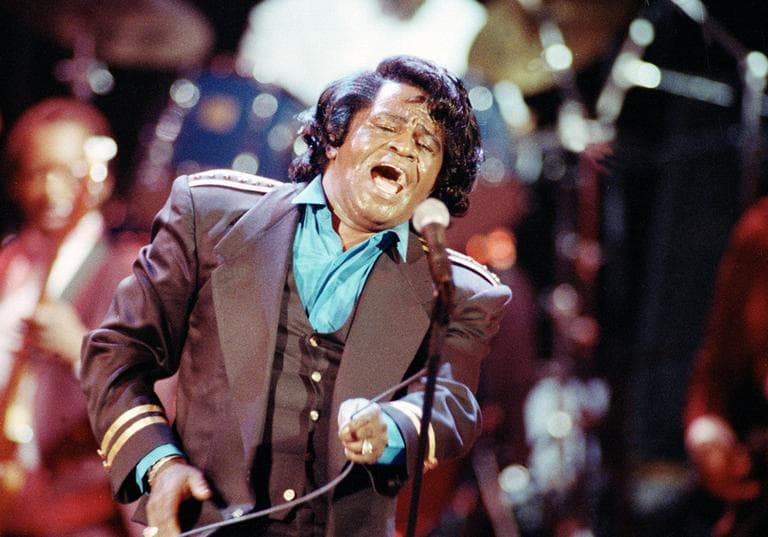Advertisement
The Music And Mission Of James Brown
A new look at the music and mission of the Godfather of Soul--James Brown.

Mister James Brown got all the top tags in soul music. Soul Brother Number One. The Hardest Working Man in Show Business. Mr. Dynamite.
The Godfather of Soul. He earned them. His stage show was so electric. His career was so long. His music so exhilarating. A new biography tells his story. Coming up hard in “Georgialina”. Battling all the way. Becoming the one.
This hour, On Point: the life and music and mission of James Brown.
-Tom Ashbrook
Guests
R. J. Smith, former senior editor for Los Angeles Magazine and contributor to blender. He is the author of The One: The Life and Music of James Brown.
Gail Mitchell, R&B senior correspondent and senior editor for Billboard Magazine.
From Tom's Reading List
The New York Times "Lovability was not Mr. Brown’s salient attribute. So the reader who knows little of Mr. Brown’s story may not instantly grasp why that story is so mesmerizing. For that reader, three words of advice: “Please, Please, Please."
USA Today "James Brown was never a big man, but even as a troubled young man growing up in abject poverty, he was larger than life. RJ Smith's The One: The Life and Music of James Brown crackles with the same intensity Brown used to overcome his destitute beginnings to become the Godfather of Soul, who could whip audiences into a sweat-drenched frenzy with his primal screams and electrifying dance moves."
Video: "Please, Please, Please" And "Night Train"
Video: Get On Up!
Playlist
“I Got You (I Feel Good)” (LIVE)
“Papa’s Got A Brand New Bag” (LIVE)
“(Call Me) Super Bad” (LIVE AT THE APOLLO, 1971)
“Please, Please, Please” (PLEASE, PLEASE, PLEASE, 1956)
“I’ve Got Money” (I’VE GOT MONEY, 1962)
“Mashed Potatoes U.S.A.” (MASHED POTATOES U.S.A., 1962)
“I’ll Go Crazy” (LIVE AT THE APOLLO, recorded 1962)
“Out of Sight” (LIVE AT THE T.A.M.I. SHOW, 1964)
“Oh Baby Don't You Weep”
“Cold Sweat”
“Say It Loud (I’m Black and I’m Proud)”
“It’s a Man’s Man’s Man’s World” (LIVE AT THE APOLLO, 1967)
“Funky Drummer”
“Get Down” by Nas
“Living in America”
“I Got You (I Feel Good)”
Excerpt: The One
Introduction
I’m not gonna show you the secret, James Brown would tell people who asked about the One, but . . . Then he would start talking.
Brown refused to reveal the mystery because the One was a trade secret. It would remain a puzzle because the more mystique it had, the more mystique he had, and mystique was good for business.
The One was a way to find yourself in the music, it was a means for drummers to come together with one another. It was a small element in a life’s work, but like the drip was to Jackson Pollock or the footnote to David Foster Wallace, for Brown the One was bigger than it first appeared, a trifling that embodied the world he made.
Maybe most of all, for James Brown, the One was an anchor, an upbeat that put him in touch with his past and who he had become.
As he once explained it: “The ‘One’ is derived from the Earth itself, the soil, the pine trees of my youth. And most important, it’s on the upbeat—ONE two THREE four—not the downbeat, one TWO three FOUR, that most blues are written. Hey, I know what I’m talking about! I was born to the downbeat, and I can tell you without question there is no pride in it. The upbeat is rich, the downbeat is poor. Stepping up proud only happens on the aggressive ‘One,’ not the passive Two, and never on lowdownbeat. In the end, it’s not about music—it’s about life.”
To Brown it was a heartbeat that connected him to the dancers and singers and time keepers who came before him. The One put him on a timeline, though the way he talked about the beat, it put him at the end of the line: the ultimate expression of a heritage.
He wasn’t gonna show you the secret. But if you listened . . .
This program aired on March 14, 2012.

